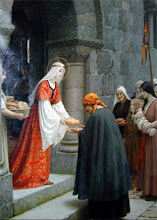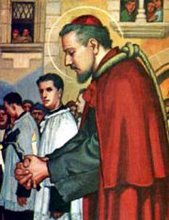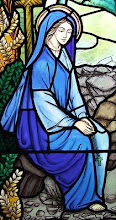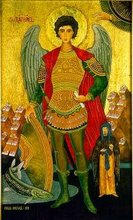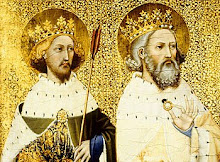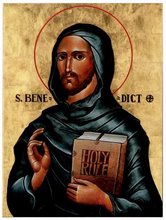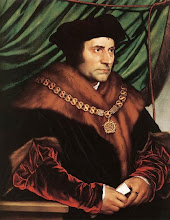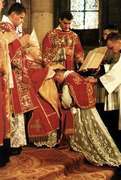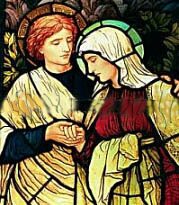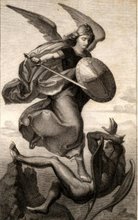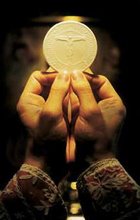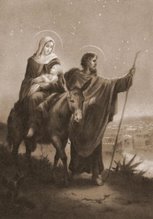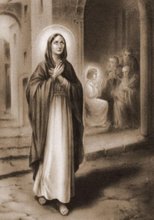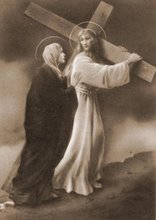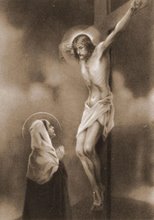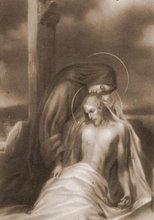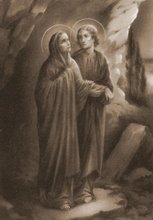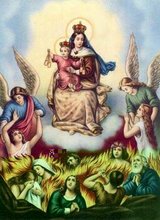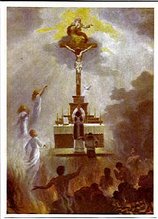
Thursday, August 28, 2008
Heroic Virtue VIII

Tuesday, August 26, 2008
Confession Holy Card
 French translation: "I shall penetrate your heart with a great abhorrence of sin."
French translation: "I shall penetrate your heart with a great abhorrence of sin."Heroic Virtue VII
 Painting of Lady Justice, Court of the Mercanzia in Florence, Author unknown: "With her large, gleaming sword and the celestial orb, over which, like any justice, she must reign forever."
Painting of Lady Justice, Court of the Mercanzia in Florence, Author unknown: "With her large, gleaming sword and the celestial orb, over which, like any justice, she must reign forever."Justice is here taken in its ordinary and proper sense to signify the most important of the cardinal virtues. It is a moral quality or habit which perfects the will and inclines it to render to each and to all what belongs to them. Of the other cardinal virtues, prudence perfects the intellect and inclines the prudent man to act in all things according to right reason. Fortitude controls the irascible passions; and temperance moderates the appetites according as reason dictates. While fortitude and temperance are self-regarding virtues, justice has reference to others. Together with charity it regulates man's intercourse with his fellow men. But charity leads us to help our neighbour in his need out of our own stores, while justice teaches us to give to another what belongs to him.
Because man is a person, a free and intelligent being, created in the image of God, he has a dignity and a worth vastly superior to the material and animal world by which he is surrounded. Man can know, love, and worship his Creator; he was made for that end, which he can only attain perfectly in the future, immortal, and never-ending life to which he is destined. God gave him his faculties and his liberty in order that he might freely work for the accomplishment of his destiny. He is in duty bound to strive to fulfil the designs of his Creator, he must exercise his faculties and conduct his life according to the intentions of his Lord and Master. Because he is under these obligations he is consequently invested with rights, God-given and primordial, antecedent to the State and independent of it. Such are man's natural rights, granted to him by nature herself, sacred, as is their origin, and inviolable. Beside these he may have other rights given him by Church or State, or acquired by his own industry and exertion. All these rights, whatever be their source, are the object of the virtue of justice. Justice requires that all persons should be left in the free enjoyment of all their rights.
(source)
Friday, August 22, 2008
Queen of Heaven

Thursday, August 21, 2008
Heroic Virtue VI

Thursday, August 14, 2008
Heroic Virtue V
St. Elizabeth is one of my many patron saints whose name for me is synonymous with the word and virtue of charity. Today she is best remembered for her charitable works, especially for the establishment of hospitals. Today, dozens of hospitals and medical centers are named for her, several of them founded by the Sisters of St. Francis. Elizabeth lived at a time when the combined disasters of climate, war, pestilence, and poverty caused great suffering, and she became devoted to helping those who had nowhere to turn.
Elizabeth was born in Hungary in 1207. Her short but fruitful life lasted 24 years; she passed away in Marburg, Germany on November 17, 1231. November 17 is the feast day of St. Elizabeth celebrated by the Church.
Read more about St. Elizabeth here.
- Provision of help or relief to the poor; almsgiving.
- Something given to help the needy; alms.
- An institution, organization, or fund established to help the needy.
- Benevolence or generosity toward others or toward humanity.
- Indulgence or forbearance in judging others. See Synonyms at mercy.
- often Charity Christianity The theological virtue defined as love directed first toward God but also toward oneself and one's neighbors as objects of God's love.
Charity inclines man to love God above all things with the love of friendship. The perfect friend of God says with St. Paul: "With Christ I am nailed to the cross. And I live, now not I; but Christ liveth in me" (Galatians 2:19-20). For love means union. Its type in heaven is the Divine Trinity in Unity; its highest degree in God's creatures is the beatific vision, participation in God's life in Heaven.
On earth charity is the fruitful mother of holiness, the one thing necessary, the one all-sufficient possession. It is extolled in I Cor., xiii, and in St. John's Gospel and Epistles; the beloved disciple and the fiery missionary of the cross are the best interpreters of the mystery of love revealed to them in the Heart of Jesus. With the commandment to love God above all Jesus coupled another: "And the second is like to it: Thou shalt love thy neighbor as thyself. There is no other commandment greater than these" (Mark 12:31).
The likeness, or the linking of the two commandments, lies in this: that in our neighbor we love God's image and likeness, His adopted children and the heirs of His Kingdom. Hence, serving our neighbor is serving God. And the works of spiritual and temporal mercy performed in this world will decide our fate in the next: "Come, ye blessed of my Father, possess you the kingdom. . .For I was hungry, and you gave me to eat. . . Amen I say to you, as long as you did it to one of these my least brethren, you did it to me" (Matthew 25:34-40). For this reason the works of charity in heroic degree have been, from the beginning to this day, a distinctive mark of the Catholic Church, the pledge of sanctity in countless numbers of her sons and daughters.
(Excerpts taken from Catholic Encyclopedia)
Monday, August 11, 2008
Great Video
I thank God for each and very Catholic who is logical, informed and says "yes" to the call to defend our faith so well. Deo Gratias!
Heroic Virtue IV
 This is "the rack" of medieval England infamy. This terrible instrument of torture was used to kill one St. Nicholas Owen, here is his brief story which I pray will demonstrate how martyrdom is a perfect example of the theological, and certainly heroic virtue of HOPE:
This is "the rack" of medieval England infamy. This terrible instrument of torture was used to kill one St. Nicholas Owen, here is his brief story which I pray will demonstrate how martyrdom is a perfect example of the theological, and certainly heroic virtue of HOPE:Saint Nicholas was probably the most important person in the preservation of Catholicism in England during the period of the penal laws against the faith. He was a carpenter or builder, who saved the lives of countless Jesuit priests in England for two decades by constructing hiding places for them in mansions throughout the country. He became a Jesuit lay brother in 1580, was arrested in 1594 with Father John Gerard, and despite prolonged torture would not give the names of any of his Catholic colleagues; he was released on the payment of a ransom by a wealthy Catholic.
Brother Nicholas is believed to have been responsible for Father Gerard's dramatic escape from the Tower of London in 1597.
Nicholas was arrested a third time in 1606 with Father Henry Garnet, whom he had served 18 years, Father Edward Oldcorne, and Father Oldcorne's servant, Brother Ralph Ashley. He refused to give any information concerning the Gunpowder Plot. They were imprisoned in the Tower of London. Nicholas was subjected to such vicious torture, which literally tore his body to pieces, killing him.
Nicholas was also known as Little John and Little Michael and used the aliases of Andrews and Draper.
Born in Oxford, England; died in the Tower of London, 1606; beatified in 1929; canonized by Pope Paul VI in 1970 as one of the Forty Martyrs of England and Wales; feast day formerly March 12.
Hope, the second theological virtue we will examine is a firm trust that God will give us eternal life and all the means necessary to obtain it; it attains heroicity when it amounts to unshakeable confidence and security in God's help throughout all the untoward events of life, when it is ready to forsake and sacrifice all other goods in order to obtain the promised felicity of heaven. Such hope has its roots in a faith equally perfect. Abraham, the model of the faithful, is also the model of the hopeful "who against hope believed in hope. . .and he was not weak in faith; neither did he consider his own body now dead.. nor the dead womb of Sara" (Romans 4:18-22).
The virtue of heroic hope especially comes to life for us when we examine the lives and particularly the deaths of the martyrs. They gave their lives rather than compromise their faith and thus exchange finite and perishable earthly life for infinite and eternal life with God in heaven. I cannot say this for certain, but I suspect that from hope springs perseverance, the kind which prevents us from falling into apostasy when faced with persecution. For Catholics this is commonly transmitted to us through the actual grace of God in the holy sacrament of Confirmation.
As an aside, did you know that confirmation places upon your souls an indelible seal? This seal cannot be removed by anything and goes with each soul either into heaven, or hell. I can only imagine that in heaven this serves only to increase your share in Christ's glory, but in hell it shall serve to increase that poor soul's suffering for all eternity.
"Beloved, do not be surprised that a trial by fire is occurring among you, as if something strange were happening to you. But rejoice to the extent that your share in the sufferings of Christ, so that when his glory is revealed you may also rejoice exultantly. If you are insulted for the name of Christ, blessed are you, for the Spirit of Glory and of God rests upon you. But let no one among you be made to suffer as a murderer, a thief, an evildoer, or as an intriguer. But whoever is made to suffer as a Christian should not be ashamed but glorify God because of the name. For it is time for the judgment to begin with the household of God; if it begins with us, how will it end for those who fail to obey the gospel of Christ? 'And if the righteous one is barely saved, where will the godless and the sinner appear?' As a result, those who suffer in accord with God's will hand their souls over to a faithful creator as they do good." (1 Peter 4:12-19)
Sunday, August 10, 2008
Heroic Virtue III
 St. Monica with her son St. Augustine of Hippo, whom God converted through her mother's perseverance in prayer for the conversion of his life of dissipation and heresy. When I think of models of heroic virtue, St. Monica always shines forth in my mind.
St. Monica with her son St. Augustine of Hippo, whom God converted through her mother's perseverance in prayer for the conversion of his life of dissipation and heresy. When I think of models of heroic virtue, St. Monica always shines forth in my mind.The few who become saints in this life are the heroes of virtue, the candidates for the honors of the altar, the saints on earth -who become the canonized saints of heaven after death.
Together with the four cardinal virtues the Christian saint must be endowed with the three theological virtues, especially with Divine charity, the virtue which informs, baptizes, and consecrates, as it were, all other virtues; which unifies them into one powerful effort to participate in the Divine life. Found in the Church's exhaustive investigation, the "proofs of heroicity" are required in the process of beatification.
As charity stands at the summit of all virtues, so faith stands at their foundation. For by faith God is first apprehended, and the soul lifted up to supernatural life. Faith is the secret of one's conscience; to the world it is made manifest by the good works in which it lives, "Faith without works is dead" (James 2:2). Such works are:
1. The external profession of faith
2. Strict observance of the Divine commands
3. Prayer
4. Filial devotion to the Church
5. The fear of God
6. The horror of sin
7. Penance for sins committed
8. Patience in adversity
All or any of these attain the grade of heroicity when practiced with unflagging perseverance, during a long period of time, or under circumstances so trying that by them men of but ordinary perfection would be deterred from acting. Martyrs dying in torments for the Faith, missionaries spending their lives in propagating it, the humble poor who with infinite patience drag out their wretched existence to do the will of God and to reap their reward hereafter, these are heroes of the Faith.
Read the list above, read them again, copy them down and post them where you can see them every day, study them, strive to live them, pray to God to help you attain each and every one. If you lack the strength, the courage, even the will - ask God for these things as well. He will order all things unto your sainthood if you ask Him too. It is His holy will that we all become saints. Amen+
Excerpts taken from Catholic Encyclopedia
Monday, August 4, 2008
We must perservere
Friday, August 1, 2008
Heroic Virtue II
 St. Thomas Aquinas
St. Thomas AquinasPhilosopher, theologian, Doctor of the Church (Angelicus Doctor)
Patron of Catholic universities, colleges, and schools
Born at Rocca Secca in the Kingdom of Naples, 1225 or 1227
Died at Fossa Nuova, 7 March, 1274
Heroic virtue is the possession of saints and a great gift from the Almighty, attained after a time of purification. Such a degree of virtue belongs only to souls already purified from all attachment to worldly things, but strongly attached to God. St. Thomas (I-II:61:4) says:
"Virtue consists in the following, or imitation, of God. Every virtue, like every other thing, has its type [exemplar] in God. Thus the Divine mind itself is the type of prudence; God using all things to minister to His glory is the type of temperance, by which man subjects his lower appetites to reason; justice is typified by God's application of the eternal law to all His works; Divine immutability is the type of fortitude. And, since it is man's nature to live in society, the four cardinal virtues are social [politicae] virtues, inasmuch as by them man rightly ordains his conduct in daily life. Man, however, must raise himself beyond his natural life unto a life Divine: 'Be you therefore perfect, as also your heavenly Father is perfect' (Matthew 5:48). It is, therefore, necessary to posit certain virtues midway between the social virtues, which are human, and the exemplary virtues, which are Divine. These intermediate virtues are of two degrees of perfection: the lesser in the soul still struggling upwards from a life of sin to a likeness with God -- these are called purifying virtues [virtutes purgatoriae]; the greater in the souls which have already attained to the Divine likeness -- these are called virtues of the purified soul [virtutes jam purgati animi]. In the lesser degree, prudence, moved by the contemplation of things Divine, despises all things earthly and directs all the soul's thought unto God alone; temperance relinquishes, as far as nature allows, the things required for bodily wants; fortitude removes the fear of departing this life and facing the life beyond; justice approves of the aforesaid dispositions. In the higher perfection of souls already purified and firmly united with God, prudence knows nothing but what it beholds in God; temperance ignores earthly desires; fortitude knows nothing of passions; justice is bound to the Divine mind by a perpetual compact to do as it does. This degree of perfection belongs to the blessed in heaven or to a few of the most perfect in this life."



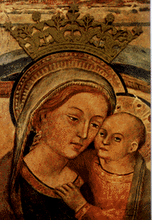
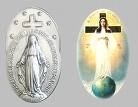

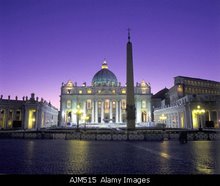

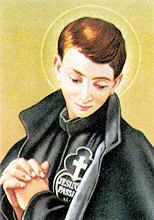
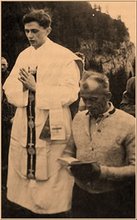
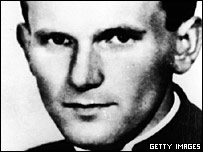
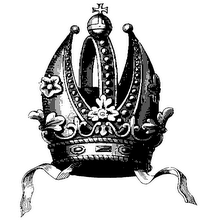
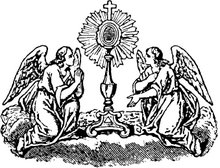
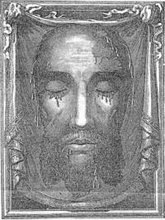
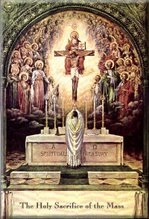

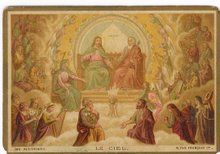




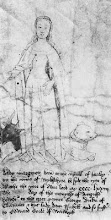01.jpg)

